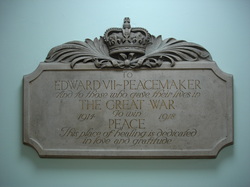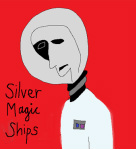
– Tomorrow We Don't"
The quotation above doesn't come from some highbrow History book or academic article exploring collective memory. Instead it's from a newspaper. The New York Times, perhaps? Or the Sydney Herald? No, the actual source was The Springfield Shopper.(1) Homer Simpson's local paper is an odd place to study history. Yet this fleeting, one-line gag in The Simpsons is in fact a witty and perceptive appreciation of how societies remember and forget.
The annals of past events are limitless. This gives rise to whole calendars of commemorations – like Martin Luther King Day. An event such as this is one of the mechanisms necessary to filter, rank and arrange the past; to make it manageable and to put it to use. To turn the past into History.
Anniversaries help supply the present with their historical fix. No matter how insatiable we are, there is always a ready supply of past pleasures and pains for us to use and abuse. One anniversary leads to another and another in a bulimic spewing up of the past.(2) And by comparing multiple commemorations of the same event we get an insight into the ways in which the past is put into the service of the present.(3)
Take today, for example. It is Armistice Day. Ninety-three years have passed since the end of the "Great War". This gives rise to the intoning of that familiar mantra:
On the eleventh hour of the eleventh day of the eleventh month of 1918,
the guns fell silent and the First World War came to an end. Today on
11th November, we remember, in silence, all those who have given
their lives in war in the cause of peace and freedom.(4)
This moment is marked by repetition. The observing of silences; the laying of wreaths; the tolling of bells; the playing of music. These recurring performances have been re-enacted following a score set down by the Royal British Legion exactly 90 years ago.
Such rituals are intended to interrupt the haphazard unfolding of day-to-day events by inserting a familiar pause – a link in time connecting our present with our past, secure in the knowledge that this will happen again in our future. This is how the chain of history is constructed. Shared memory is deployed to forge collectivities.
Repetition and sameness are emphasised. But, if we look carefully, what they actually highlight is that which is different or new. Thus, whilst we are remembering past wars, we are also encouraged to reflect on current conflicts. Those that observe silences or gather around memorials in the UK are made aware that British soldiers in Afghanistan are doing just what their forebears did, namely giving "their lives in war in the cause of peace and freedom."
Not everyone agrees with this, of course. Certain members of the now-illegal "Muslims Against Crusades" were planning a counter demonstration today. They too wished to observe this memorial occasion and its associated symbolism. Yet they would prefer to burn a plastic poppy rather than place it at the foot of an old war memorial. Such behaviour is distasteful and disrespectful – but should it be punishable by imprisonment?
The potency of the poppy confirms the sense in which 'the flower has become an iconic symbol of remembrance and sacrifice.'(5) Its importance and that of the November ritual as a whole appears to be increasing rather than diminishing as the years go by. This explains the seemingly disproportionate amount of attention the media devotes to reports of a war memorial being vandalised or dishonoured. A steadily rising number of plaques listing the names of the dead have been stolen from such monuments. The high value of scrap metal makes an uncomfortable parallel with the high value of the sacrifice inscribed in each and every liquefied name.
The heat required to melt these metal sheets is matched by the temperature rising in commemorative terms. This is due to the imminent arrival of the centenary of the outbreak of the First World War. Will 2014 represent a high-water mark of remembrance? We can't know the answer to this because we simply don't know what the future holds or what future generations will choose to remember and forget.
So it seems fair to say that The Springfield Shopper headline got it right and wrong: "Today We Remember Armistice Day – Tomorrow We Don't". But the day after that we will: it's Remembrance Sunday. And the wreath-laying rituals will be repeated all over again – for some people at least.
_____
Notes
(1) 'The Springfield Shopper', The Simpsons 18/9 (2006).
(2) Pierre Nora, Realms of Memory: The Construction of the French Past. Vol. III: Symbols, New York, Columbia University Press, 1998, p. 609.
(3) Stuart Burch, 'The Texture of Heritage: A Reading of the 750th Anniversary of Stockholm', International Journal of Heritage Studies, Vol. 11 (3), 2005, pp. 211-233.
(4) BBC Radio 4 News, 11:00, 11/11/2011.
(5) Angus Crawford, The World at One, BBC Radio 4, 11/11/2011.
__________
Supplemental
18/11/2011
One American citizen who does not observe Martin Luther King Day is George Orr, the principal protagonist in Ursula K. Le Guin's superb book, The Lathe of Heaven (1971). He is able to alter the world by having what he terms "effective" dreams (p.13). Orr's unconscious solution to racism is to dream into existence a globe populated solely by grey-skinned people. But in so doing he erases the woman he loves: Heather Lelache's "color of brown was an essential part of her, not an accident... She could not exist in the gray (sic) people's world. She had not been born." (p. 129) And that is not all: this is also now a world that "found in it no address that had been delivered on a battlefield in Gettysburg, nor any man known to history named Martin Luther King." (p. 129) All this might seem like "a small price to pay for the complete retroactive abolition of racial prejudice". But George Orr finds the situation "intolerable. That every soul on earth should have a body the color of a battleship: no!" (p. 129).
Source:
Le Guin, Ursula K. (1971/2001) The Lathe of Heaven (London: Orion)





